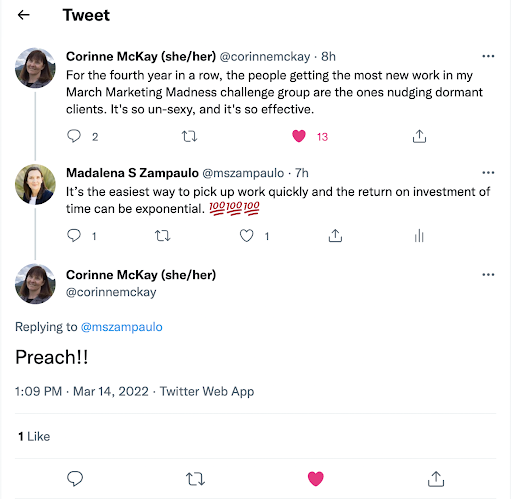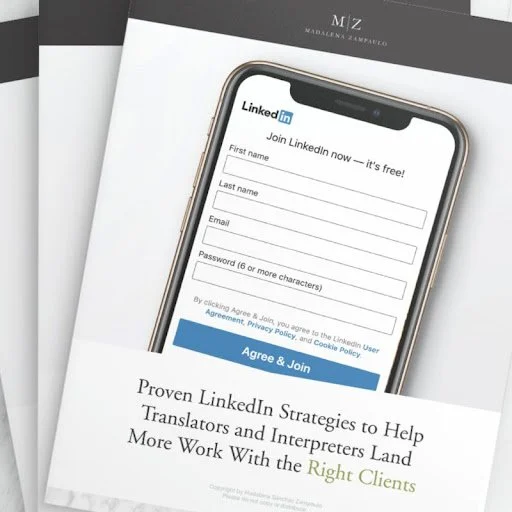Basic (and Super Effective) Marketing Strategies for Translators and Interpreters
We often make marketing more difficult and complicated than it really is. I know I've been guilty of this, too.
We might even think, "Marketing is hard." or "I hate marketing my business." or "I don't know how to sell. I just want to translate."
But I have found that these statements are only true if we allow them to be. In other words, if we can simply go back to the marketing basics, we'd actually find that marketing is easy. We might even enjoy it because we'd see that it works. And we could start making it a regular part of our daily business routine.
Complicating marketing techniques by using words or strategies that feel like they're not your own can often lead to stalling out before you even get started.
Many freelance translators and interpreters avoid marketing altogether because they worry they won't:
Be able to market their business in a way that feels genuine and authentic
Be able to keep up with it (so why even start?!)
Get enough return on their time investment
The key to sustainable (and super effective) marketing is keeping it simple and sticking to the basics. The techniques that are tried and tested. The ones that work and can be adapted to fit your business, voice, and goals.
Why do the basics work so well?
Basic marketing techniques work because they are doable. They don't require lots of bells and whistles. If you can commit to being consistent with the basics, you will see results. And as you start to see what works, you can do more of it. Sticking to the basics in a way that fits your schedule and business will ensure that you can maintain the same level of commitment to your marketing, even if it's just 15 to 20 minutes a day!
The basics should also be simple to achieve. It's easy to think we have to do something different every time we reinvigorate our marketing efforts. After all, if we tried something once and it didn't work, we can feel deflated and frustrated. But trying something once isn't enough to know whether it's an effective marketing strategy. Marketing is about building relationships, which takes time and consistency. By sticking to the basics, you can commit to short bursts of time that add up to big results.
Finally, basic marketing techniques work well because you can adapt them to feel like you. You can use words that will resonate with your clients without sending a hard sales pitch (no one wants to receive those, right?). Talk to your clients through your marketing messaging as though they were sitting right in front of you. Doing so helps you be authentic and use your own voice, which is way more effective in building the relationships and partnerships you want to have in the long run.
What do basic marketing strategies look like for freelancers?
The easiest and most effective kind of marketing, the kind you can stick with and that works, is usually quite simple. In fact, it's so simple, many people forget to do it.
Take this example. Writer, editor, and podcaster Melanie Padgett Powers has been sharing her own success with a very simple marketing strategy. Over the past two+ years, Melanie has sent emails to her network to let them know what kind of work she's looking for. She gets specific, too. Not only has this single email paid off for Melanie, but it paid off twice! Melanie's simple, straightforward, and authentic emails resulted in projects totaling $30K each. Yes, each!
Melanie has shared about her successful 2021 in an annual recap episode on her podcast, as well as how to drum up new business on the podcast I co-host, Smart Habits for Translators. And not a single strategy she shares is overly complicated or salesy. She also offers templates of the two emails that landed her a total of $60K just for subscribing to her newsletter. Melanie is an excellent example of someone who doesn't care for traditional networking or hardcore pitching and who's found success by keeping it simple.
Another example of a simple marketing strategy is one I use fairly often in my own business. Colleague Corinne McKay and I have talked about this one several times, and she includes this basic marketing strategy in every session of her March Marketing Madness challenge group:
If you haven't heard from a client in a while, giving them a "nudge" might be a great way to remind them that you're available to help them. Send your "dormant" clients a warm email to check in with them and see if there's anything you can help them with. I do this several times a year, and every time I do it, I get at least one response that results in several thousands of dollars' worth of work. It's simple. And it works (really well!).
What basic marketing strategies work for translators and interpreters?
So, what do "the basics" look like? If you're ready to start marketing your business more consistently, consider learning from people who share their successful strategies and adapt them to your own business.
Here's a brief list to help you get back to the basics that work:
Deliberate Freelancer Episode 43: 33 Ways to Find More Clients
Sarah Silva's guest post: Finding Direct Clients Through Direct Marketing
Smart Habits for Translators
Corinne McKay's
My blog posts:
These are only a few of the many resources available on basic marketing strategies. There will always be other marketing techniques you can learn and implement. But before you do, it's best to master the basics and get your mindset in the right place. As you become more comfortable marketing your business regularly, you can add strategies that are more complex or involved. Nevertheless, keeping basic techniques in your marketing toolkit means you'll always have strategies you can rely on to keep things moving in your business.
What basic marketing strategies have worked well for you? Do you build your marketing routine into your workday?
Have you signed up for my email list where I share online presence tips, resources, and bonus content? When you do, you'll get this freebie guide, Proven LinkedIn Strategies to Help Translators and Interpreters Land More Work With the Right Clients, sent right to your inbox.



